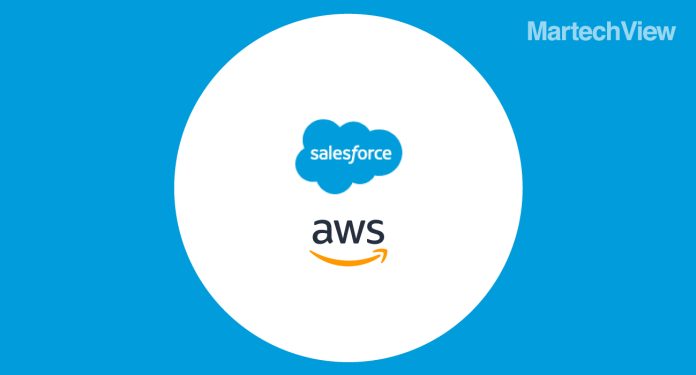Salesforce will now support Amazon Bedrock, a fully managed service that makes foundation models from leading AI companies available through a single application programming interface.
Amazon Web Services and Salesforce have expanded their partnership, deepening product integrations across data and artificial intelligence and offering select Salesforce products on the AWS Marketplace.
The Salesforce products now available on AWS Marketplace include Data Cloud, Service Cloud, Sales Cloud, Industry Clouds, Tableau, MuleSoft, Platform, and Heroku.
Salesforce will now support Amazon Bedrock, a fully managed service that makes foundation models from leading AI companies available through a single application programming interface. This will make Amazon Bedrock available through the Einstein Trust Layer, powering AI-driven apps and workflows in Salesforce. In addition, Salesforce Data Cloud will expand to support data sharing across additional AWS technologies. These Data Cloud integrations will be governed by new centralized access controls to manage secure user access at the folder, object, and file level for Data Cloud content stored in Amazon Simple Storage Service (Amazon S3).
As part of this partnership, Salesforce will expand its use of AWS, including compute, storage, data, and AI technologies through Hyperforce to further enhance popular services like Salesforce Data Cloud. AWS will also expand its use of Salesforce products such as Salesforce Data Cloud.
The two companies are also making Data Cloud a comprehensive, flexible, and secure software-as-a-service data platform for their customers. New zero extract, transform, and load integrations will reduce the need for customers to build their own ETL pipelines between Data Cloud and AWS data services. Additionally, customers will be able to securely run their own code for data processing tasks, such as complex transformations, calculated insights, data triggers, or user-defined functions with Data Cloud that will be powered by AWS compute services like Amazon Elastic Compute Cloud (Amazon EC2), Amazon Elastic Kubernetes Service (Amazon EKS), and AWS Lambda.
Mutual Salesforce and AWS customers will also be able to use new solutions like Salesforce Prompt Builder, part of the Einstein Copilot Studio, to create custom prompt templates grounded in their data and use techniques such as retrieval-augmented generation (RAG) with models from leading AI companies, including AI21 Labs, Amazon, Anthropic, Cohere, Meta, and Stability AI. In addition to accessing their own FMs through an integration between Data Cloud and Amazon SageMaker, developers can use simplified tooling to fine-tune FMs on Amazon Bedrock through the Einstein Trust Laye and power generative AI experiences across the Salesforce Customer 360 platform.
Salesforce and AWS are also deepening the Service Cloud Voice and Amazon Connect integration, bringing Amazon Connect Chat to Service Cloud Digital Engagement and Amazon Connect forecasting, capacity planning, and agent scheduling to enhance the Salesforce Service Cloud Omnichannel supervisor experience. Also included are integrated generative AI capabilities powering unified customer insights and both agent and manager automated assistance.
And finally, Salesforce is working with AWS to reimagine Heroku as the platform-as-a-service layer for development of AI-first apps across Salesforce and AWS. Heroku will fortify its Dyno compute functionality by using the infrastructure from AWS, including accelerated Amazon EC2 instances powered by Nvidia GPUs, AWS Trainium, and AWS Inferentia for machine learning (ML) training and inference, along with additional GPU-optimized EC2 instances for graphics-intensive applications. They will also use AWS Graviton-based EC2 instances for the best price-performance compute. In addition, Heroku will help customers build applications faster and more securely with Amazon CodeWhisperer. Salesforce developers will also be able to use Einstein Copilot Studio to create custom actions that Einstein Copilot can invoke, which range from workflows in Salesforce to services hosted on AWS.
“Today’s announcement is an incredible milestone in the evolution of our long-standing partnership with AWS,” said Marc Benioff, chair and CEO of Salesforce, in a statement. “We’re bringing together the number-one AI CRM provider and the leading cloud provider to deliver a trusted, open, integrated data and AI platform and ensuring we meet massive customer demand for our products on the AWS Marketplace. With these enhancements to our partnership, we’re enabling all of our customers to be more innovative, productive, and successful in this new AI era.”
“Salesforce and AWS make it easy for developers to securely access and leverage data and generative AI technologies to drive rapid transformation for their organizations and industries,” said Adam Selipsky, CEO of AWS, in a statement. “With this expanded partnership, our joint customers gain powerful new ways to innovate, collaborate, and build more customer-focused applications using the broadest and deepest set of cloud services.”










